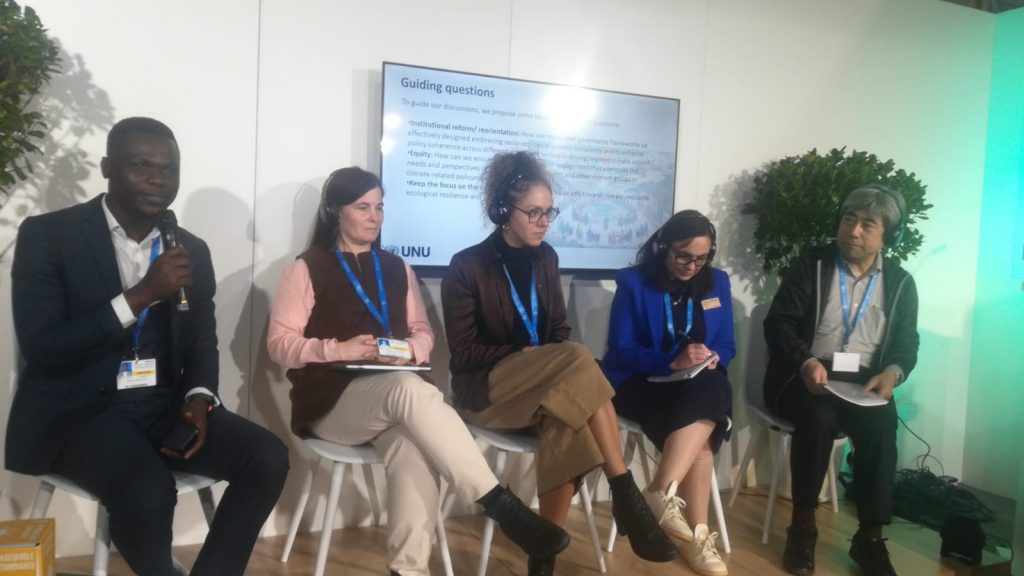Every year, the Conference of the Parties of the United Nations Framework Convention on Climate Change (UNFCCC) brings together world leaders, policymakers, climate experts, and stakeholders from around the globe to address the urgent challenges of climate change. COP 29th edition built on the progress made in previous COP meetings, particularly around implementing the Paris Agreement, with the goal of keeping global warming well below 2°C and striving to limit it to 1.5°C. CMCC adaptation team composed by Jaroslav Mysiak, Anna Pirani, Elisa Calliari, Marta Ellena, Caterina Guidi supported the Ministry of the Environment and Energy Security (MASE) delegation in EU-centred negotiations. A series of events featured CMCC projects, including CLIMAAX and Adaptation AGORA.

Ellena attended the side event “Dialogue: Operationalizing Multilevel Policy Coherence for Targeted Climate Action“, organised by UNU-IAS, UNU-CRIS, and UNU-MERIT, that took place on November 15 at the SDG Hub. Facilitators include Suneetha M Subramanian, Nidhi Nagabhatla, and Sanae Okamoto, with panellists from diverse international organisations and regions. The dialogue addressed the complexities of climate action by exploring strategies for aligning sectoral policies to enhance socio-ecological resilience and resource efficiency. Using the fishbowl methodology, the session fostered interactive dialogue among experts and participants, discussing how to navigate multi-level governance and ensure inclusive stakeholder engagement. To guide the discussions, a few background research questions were suggested to speakers:
- How can multi-level governance frameworks be effectively designed to enhance policy coherence across different sectors in driving targeted climate action?
- What mechanisms can be implemented to ensure inclusive stakeholder engagement that addresses the needs and perspectives of marginalized communities in climate-related policymaking?
- In what ways can we identify and mitigate trade-offs between competing policy objectives to promote sustainable development while achieving climate resilience
Ellena provided a focused contribution on the second research question, emphasizing mechanisms for inclusive stakeholder engagement, particularly in addressing the needs and perspectives of marginalized communities in climate policymaking actions. Highlighting the Mission of Adaptation to foster resilience and equity, Ellena introduced the AGORA Community Hub platform as a pivotal tool for facilitating inclusive dialogue and capacity-building among diverse stakeholders.
She also presented insights from the CLIMAAX project, which offers innovative tools for climate adaptation risk assessment and planning. Furthermore, Ellena shared examples from the Italian pilot project under AGORA, the City of Rome, which has actively engaged specific target groups such as workers, the youngest and multicultural communities, ensuring that their voices and priorities are integrated into adaptation strategies. Her intervention underscored the importance of co-creation processes and localized solutions in driving equitable and inclusive climate action.



